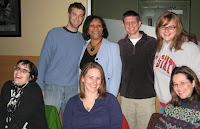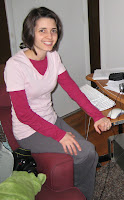A space to share the creation of my first film, a documentary about the Montagnard people who served as American allies during the Vietnam War
Friday, February 19, 2010
Finance Plans for Indie Films
Every now and then I look up from editing to take a deep breath and stretch. Today I came across this article while doing so: Top Independent Filmmakers, Take Finance Plans Seriously. It's a short, well written article and something I look forward to revisiting when we finish Abandoned Allies.
There's no clue what the future will bring, but I know that filmmaking is something I will love for a very long time. I look forward to having a financial plan for the next film I do and hopefully a bit of financial backing, too.
Thursday, February 18, 2010
Triangle Film Society Launches March 4th
I was told that the society is a means to unite some of the existing film communities in the area. Over the past few months, my friends have graciously introduced me to some of those existing communities and I am delighted about them! It is so much fun to be in a room full of people passionate about filmmaking. The energy is tangible.
Sorry for the confusion, folks. Nene and I had several conversations since my event in January, and she asked me to help promote the Triangle Film Society. Nene informed me that they have a limited amount of space at the venue for the launch party so it is, in fact, not open to the public. This is a great lesson in today's age of rapid communications, no?! I'm told that they will have an event later that is open to the public, although I don't have the details on that yet.
Wednesday, February 17, 2010
25 Tips to Make Documentary Film Interviews Better When Going Solo
- Ask someone to help you: carry equipment, set up, run errands, etc.
- Read as much as possible about conducting interviews, the subject matter of your film, and the expertise of your interviewee before filming begins.
- Get a lot of rest before the interview.
- Pack your bags and check them twice. Do you have all of your cables, tapes, notes, extension cords, extra batteries, 2 sets of head phones, etc.?
- Get to the location earlier than you think you should.
- Bring water for you and the interviewee.
- Bring your digital camera (not just film equipment). Take a picture of the subject for promotional materials before the interview begins. Take a picture of the subject in front of the cameras so you'll have behind the scenes promotional materials.
- Schedule breaks for lunch so you don't work / film for 12 hours straight.
- Have your questions ready--all typed on one page so you can look down easily to get to the next one.
- Share the questions with the interviee prior to filmming, but only if appropriate to do so.
- Interview the person in chronological order--don't jump from past to present too much if possible.
- Choose a quiet room, with no distractions/interruptions to conduct the interview.
- Choose a background that's not distracting.
- Choose comfortable chairs that make no noise when sitting in them. (Or choose uncomfortable chairs if you want to have a certain impact on the person you're interviewing.)
- Choose a room that has no windows if you have lighting equipment. The sunlight will change a lot during the course of your interview, causing lighting inconsistencies on film.
- Remember to turn off the room's lights if you have lighting equipment. They may cast an unwanted tone on your subject.
- Put the camera in front of you so you can be sure the subject matter is framed properly.
- Wear ear phones to be sure the audio is being captured.
- Don't make any noises while they interviewee is talking.
- Maintain eye contact with the interviewee while they're speaking and react to what they're saying--nod, smile, laugh, etc.--but do so silently.
- Don't worry about stopping / starting the tape if there are interruptions.
- Ask questions so that the interviewee speaks in complete sentences, not just yes or no answers
- Be patient. Give the interviewee the moments of silence so they can organize their thoughts before you move on to your next question.
- Don't be afraid to cut them off if the interviewee derails from the information you really hope to capture. Every minute of what's filmed costs money in tape availability, transcriptions of footage and time spent editing it out later.
- Get your interviews transcribed by a professional to make editing easier later.
There are so many more tips to share, but one of the best ways to learn is by doing. I had to learn a lot of this by diving in, with my executive producer's support and encouragement. Sink or swim isn't always the best way to learn, but it will certainly make those lessons hard to forget.
Tuesday, February 16, 2010
Surround Yourself with the Very Best

The Cove

This weekend I finally had a chance to watch The Cove. It's a film about the slaughtering of dolphins in Japan. Annually, about 23,000 dolphins are killed in this little cove in Taiji, Japan. Those that aren't killed go into captivity to perform for people. At the end of this post is a synopsis pulled from their website.
The Cove begins in Taiji, Japan, where former dolphin trainer Ric O’Barry has come to set things right after a long search for redemption. In the 1960s, it was O’Barry who captured and trained the 5 dolphins who played the title character in the international television sensation “Flipper.”
But his close relationship with those dolphins – the very dolphins who sparked a global fascination with trained sea mammals that continues to this day -- led O’Barry to a radical change of heart. One fateful day, a heartbroken Barry came to realize that these deeply sensitive, highly intelligent and self-aware creatures so beautifully adapted to life in the open ocean must never be subjected to human captivity again. This mission has brought him to Taiji, a town that appears to be devoted to the wonders and mysteries of the sleek, playful dolphins and whales that swim off their coast.
But in a remote, glistening cove, surrounded by barbed wire and “Keep Out” signs, lies a dark reality. It is here, under cover of night, that the fishermen of Taiji, driven by a multi-billion dollar dolphin entertainment industry and an underhanded market for mercury-tainted dolphin meat, engage in an unseen hunt. The nature of what they do is so chilling -- and the consequences are so dangerous to human health -- they will go to great lengths to halt anyone from seeing it.
Undeterred, O’Barry joins forces with filmmaker Louis Psihoyos and the Oceanic Preservation Society to get to the truth of what’s really going on in the cove and why it matters to everyone in the world. With the local Chief of Police hot on their trail and strong-arm fishermen keeping tabs on them, they will recruit an “Ocean's Eleven”-style team of underwater sound and camera experts, special effects artists, marine explorers, adrenaline junkies and world-class free divers who will carry out an undercover operation to photograph the off-limits cove, while playing a cloak-and-dagger game with those who would have them jailed. The result is a provocative mix of investigative journalism, eco-adventure and arresting imagery that adds up to an urgent plea for hope.
The Cove is directed by Louie Psihoyos and produced by Paula DuPre Pesman and Fisher Stevens. The film is written by Mark Monroe. The executive producer is Jim Clark and the co-producer is Olivia Ahnemann.
Monday, February 15, 2010
Conversations with Annie Beth

This weekend Annie Beth came to visit. It was so wonderful to catch up with her! We know one another from good old Little Washington, where we ran cross country together. Annie Beth is a firecracker, I tell ya what!
Editing Challenges

So, I didn't get a total rough cut ready for Annie Beth's visit last weekend, as I had hoped. But setting deadlines gets me motivated, and puts the pressure on to get things done. Despite my best efforts to get it finished, we had an external hard drive fail, an editor out sick, project files that wouldn't open and a handful of other challenges.